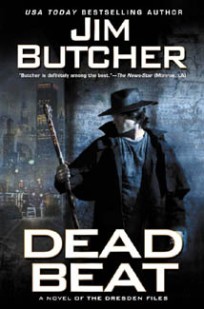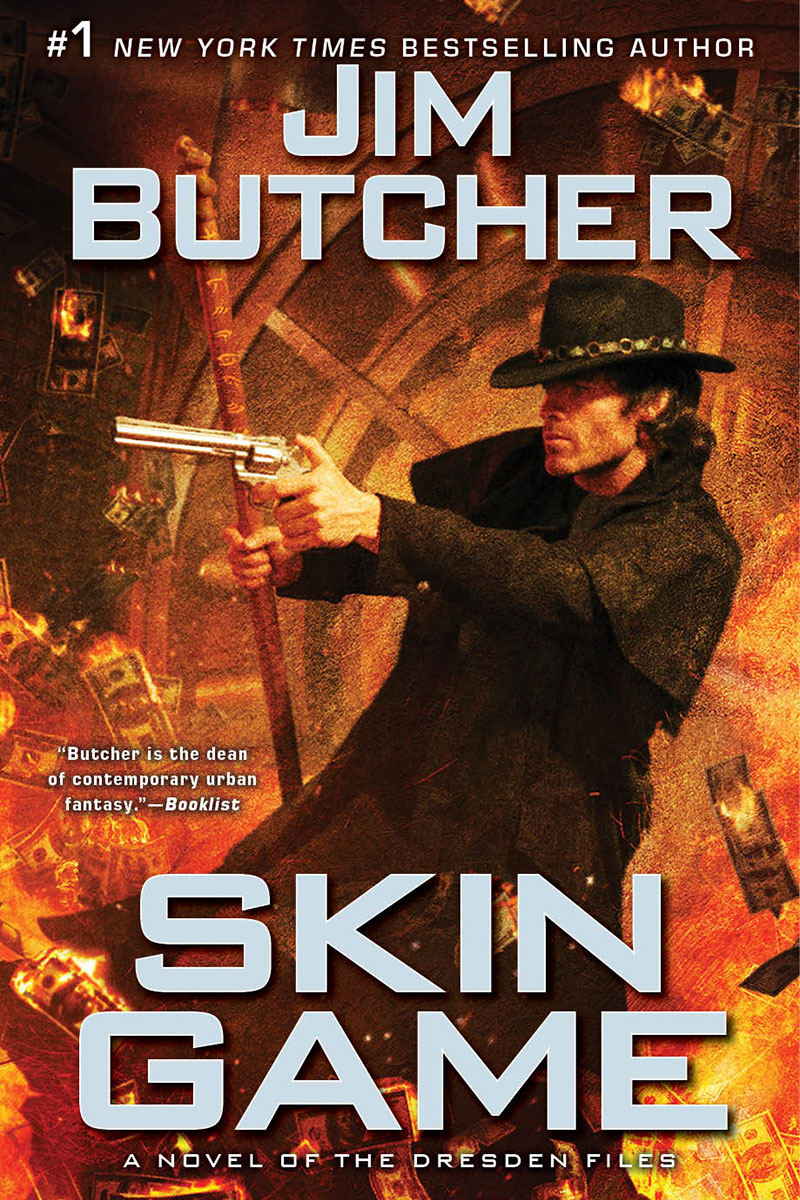Sometimes I look forward to a new blog post less than other times, especially when things are shades of grey (though fewer than fifty – not going there) or if it’s a disappointing negative review. Other times, though, it gives me that most golden of opportunities: the chance to legitimately gush about something I like.
I keep banging on about how I tend to aver from long, epic novel series (there’s a reason I’ve never reviewed Game of Thrones) and yet there are two exceptions. As established, the Honor Harrington Series is one of them. The other is Jim Butcher’s Dresden Files, the 14th and most recent of which, Cold Days, I lately finished.

My favourite, but one of many!
The Dresden Files are named for their main character: Harry Dresden, a wizard who runs a private detective service in Chicago. Called upon to take cases involving occult mysteries of all sorts ranging from curses to black magic to possession, and clients ranging from shellshocked spouses to troubled teens to the Queen of Winter herself. Harry’s tenacious and cavalier style rubs him up the wrong way against the White Council, the aloof, often cold and officious rulership of wizards, and against such forces as vampires, spirits of the seasons and the mysterious Black Council, a hidden organization whose hand is behind much of the chaos aggrieving Chicago and our hero and his friends.
I made a passing remark that the Mortal Instruments that it’s one of few examples in vogue these days of urban fantasy – that is, stories of the fantastical and supernatural that also use the modern city rather than the forests, meadows and castles on hilltops the word ‘fantasy’ traditionally implies. Jim Butcher clearly knows and loves Chicago and its streets and set pieces form a wonderful variety of backdrops for the books.
Chicago is just the kind of town for this sort of thing, glamour and gungy bits in just the right proportions: up until book seven or so, the novels are styled after noir crime novels, where the long-suffering detective has a funny customer come in and ask them to look into something. Although the ‘funny customer’ is sometimes, for example, a vampire as in Dead Beat. He starts following the trail in a determined, focused, somewhat thickheaded persistent way, hits up his contacts on the force and the underworld, and finds himself up to his neck into something way bigger than he bargained for. In Dead Beat for instance, a massive necromantic summoning plotted by the cult of an infamous sorcerer.
Since Proven Guilty or so, the stories have changed tone, with Harry moving into a different role as guardian, father figure to his apprentice, and the progression of his pals and contacts to becoming truly dear to him; the plotting goes from a detective and his band of brothers (and sisters) to more of a ‘created family’ dynamic, a la Buffy the Vampire Slayer. This is in aid of a raising of the stakes and the transition from semi-episodic style to a bigger scope, much the same as Honor Harrington or, to be more on point, the Laundry Files.
It has been said that every so often, one discovers a story that fundamentally clicks with you. The writing style, the characters, or something about it just makes it work. The Dresden Files and the Laundry Files, for me, are those stories. Thinking about it, I’m not sure there’s a single fictional character I’ve personally related to as much as I have Harry Dresden. He’s impatient, knowledgable but not a particularly profound thinker, who goes at problems head-on, has a strong sense of right and wrong and a complete lack of tact or guile when it comes to the latter. He’s a rescue the innocents, blast the bad guy to pieces kind of a guy. He’s also shortsighted, a wise guy, given to self-reproach and shouldering absolutely astonishing amounts of guilt. And he has, by his own admission, some rather chauvinistic if good-hearted ideas about how to treat women. In short, this is what a real guy like him would be like, if he also happened to be a wizard.
The stories themselves introduce you to the world of magic a little bit at a time. It’s very much in the tradition of the “all legends are true” style, where Queen Mab, Titania, Kris Kringle, the Archangels, vampires, werewolves, dragons and many others exist and are as complex and formidable as the stories that have grown up around them. Butcher clearly knows his folklore and doesn’t play the ‘modern’ versions of these ideas the way, say, the Mortal Instruments or Buffy tended to do.
Speaking of Buffy the Vampire Slayer, the thing that cinches the deal for me is that the Dresden Files are hilarious. I mentioned that Harry is a wisecracker extraordinare. His internal monologues are consistently hilarious and his banter with his porn-loving spirit assistant, Bob the Skull, is always good value.
“‘Then why is it that you stare at naked girls every chance you get,” I said, “but not naked men?’
‘It’s an aesthetic choice,’ Bob said loftily. ‘As a gender, women exist on a plane far beyond men when it comes to the artistic appreciation of external beauty.’
‘And they have boobs,’ I said.
‘And they have boobs!’”
-from Turn Coat
As in the Laundry novels, the juxtaposition of all this magic and sorcery with banal everyday life or one’s expectations (such as Harry getting into a punch-up with Father Christmas or bribing pixies with pizza) is a great source of comedy.
And, putting a cherry on it all, Butcher has the nerdiest sense of humour ever! The texts are peppered with references to all sorts of fandoms. Dresden verifies his identity to his apprentice in Ghost Story by telling her she’s to go to the Dagobah System and learn from Yoda. Once there was a reference to the Princess Bride and to Firefly in the same paragraph! Bliss! Factor in Star Trek, the Lord of the Rings, the Evil Overlord List…it’s gloriously funny.
The Dresden Files aren’t the heaviest read in the world, usually. As with most mystery stories I have to read them more than once sometimes to get my head around them. I also have trouble remembering what happens in which books. As fun as they are, they all sort of bleed together for me. Maybe it’s because, while it’s one of the few I can really get into, the Dresden Files are written in first person.
As is usually the case, the change in style as the scope of the stories has widened might lose some readers. I was also getting the feeling, around the time of Changes, that the sheer amount of angst, pain and difficulty Harry’s life has subjected him to was getting to a point of overload, but for my money Butcher knows just when to let something really good happen to let the pressure off a bit. The pacing had a bit of a jumpy period between Proven Guilty and Changes, I felt, as the stakes of each book would soar pretty high before going back to something about level with the status quo. Changes in particular might have seemed like an ending, and yet we continue. Given all the crazy, fate-defying things he’s done, one wonders how Dresden’s story could possibly be brought to a satisfactory and fulfilling conclusion at this point. This is why I distrust these long runners: they weave themselves ever more intricate and you start to wonder how it could possibly live up in the end to the buildup it’s been having. Plus, for all the trauma and emotional turmoil Harry experiences, the terrible things that happen only seem to really affect him when the plot needs them to. Otherwise, given the horrible battles he’s been in, you wonder how he could still be functional after all this time.
All of these are mostly open questions, for the moment anyway. They’re not as intellectually profound as the Laundry Files, but they are funny, geeky, exciting, melodramatic, gritty, and enthralling. Jim Butcher and Charles Stross, very much brothers in their trade, are probably my two favourite writers active today, after Sir Terry Pratchett, of whom both are demonstrably big fans. I heartily recommend any of the first six books to get your feet wet and see if you want to dive in, ‘cause it’s endless fun.
“’No,’ I thought ‘It’s Harry Dresden the, uh, lizard! Harry Dresden the wizard is one door down.’”
–Storm Front


